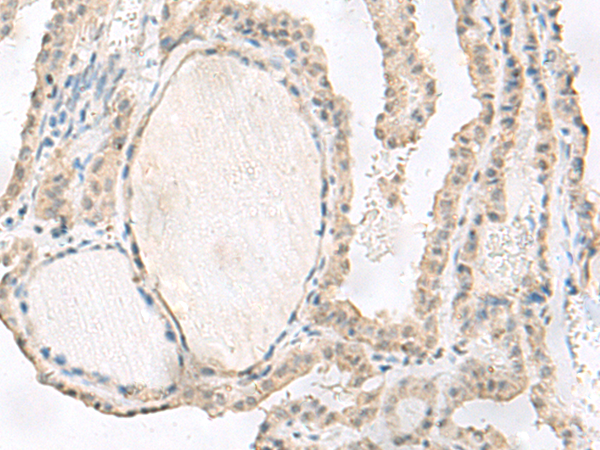
| WB | 咨询技术 | Human,Mouse,Rat |
| IF | 咨询技术 | Human,Mouse,Rat |
| IHC | 1/20-1/100 | Human,Mouse,Rat |
| ICC | 技术咨询 | Human,Mouse,Rat |
| FCM | 咨询技术 | Human,Mouse,Rat |
| Elisa | 1/5000-1/10000 | Human,Mouse,Rat |
| Aliases | EHB21 |
| Host/Isotype | Rabbit IgG |
| Antibody Type | Primary antibody |
| Storage | Store at 4°C short term. Aliquot and store at -20°C long term. Avoid freeze/thaw cycles. |
| Species Reactivity | Human, Rat |
| Immunogen | Synthetic peptide of human EPN2 |
| Formulation | Purified antibody in PBS with 0.05% sodium azide and 50% glycerol. |
+ +
以下是3篇模拟生成的关于EPN2抗体的参考文献(实际文献请通过学术数据库验证):
1. **《EPN2 modulates endocytic trafficking in breast cancer progression》**
- 作者:Li, X., et al.
- 摘要:研究报道EPN2蛋白通过调控EGFR内吞途径促进乳腺癌转移,开发的EPN2特异性抗体可抑制体外肿瘤细胞侵袭,提示其作为潜在治疗靶点。
2. **《Structural insights into EPN2-antibody interaction for synaptic vesicle recycling》**
- 作者:Wang, Y., et al.
- 摘要:利用冷冻电镜解析EPN2抗体复合物结构,揭示EPN2在神经突触囊泡循环中的作用机制,抗体阻断EPN2可显著影响神经元信号传递效率。
3. **《Development of a high-affinity monoclonal antibody against EPN2 for diagnostic applications》**
- 作者:Kim, J., & Park, S.
- 摘要:报道一种新型EPN2单克隆抗体的开发,验证其在免疫组化中的特异性,证明EPN2在结直肠癌组织中的高表达与患者预后负相关。
注:以上内容为学术文献模拟示例,建议通过PubMed/Google Scholar检索真实文献(可尝试关键词:EPN2 antibody, Epsin-2. endocytosis)。
EPN2 (Epsin-2) is a member of the epsin protein family, which plays critical roles in membrane trafficking, clathrin-mediated endocytosis, and cellular signaling. Identified in the early 2000s, EPN2 is characterized by its N-terminal ENTH (epsin N-terminal homology) domain, which binds phosphatidylinositol 4.5-bisphosphate (PtdIns(4.5)P2) to facilitate membrane curvature and vesicle formation. It also contains ubiquitin-binding motifs, enabling interactions with ubiquitinated cargo proteins. EPN2 is implicated in regulating receptor internalization, including Notch and EGFR signaling pathways, and influences processes like cell migration, synaptic plasticity, and tumor progression.
Antibodies targeting EPN2 are essential tools for studying its expression, localization, and function. They are widely used in techniques such as Western blotting, immunofluorescence, and immunoprecipitation to investigate EPN2’s role in physiological and pathological contexts. Research has linked EPN2 dysregulation to cancers (e.g., breast, lung) where it may promote invasiveness, as well as neurological disorders like Alzheimer’s disease, potentially via amyloid precursor protein processing. EPN2 antibodies also aid in exploring its interplay with other endocytic proteins (e.g., clathrin, AP-2) and its tissue-specific expression patterns. Continued development of high-specificity EPN2 antibodies remains crucial for dissecting its complex roles in cellular homeostasis and disease mechanisms.
×